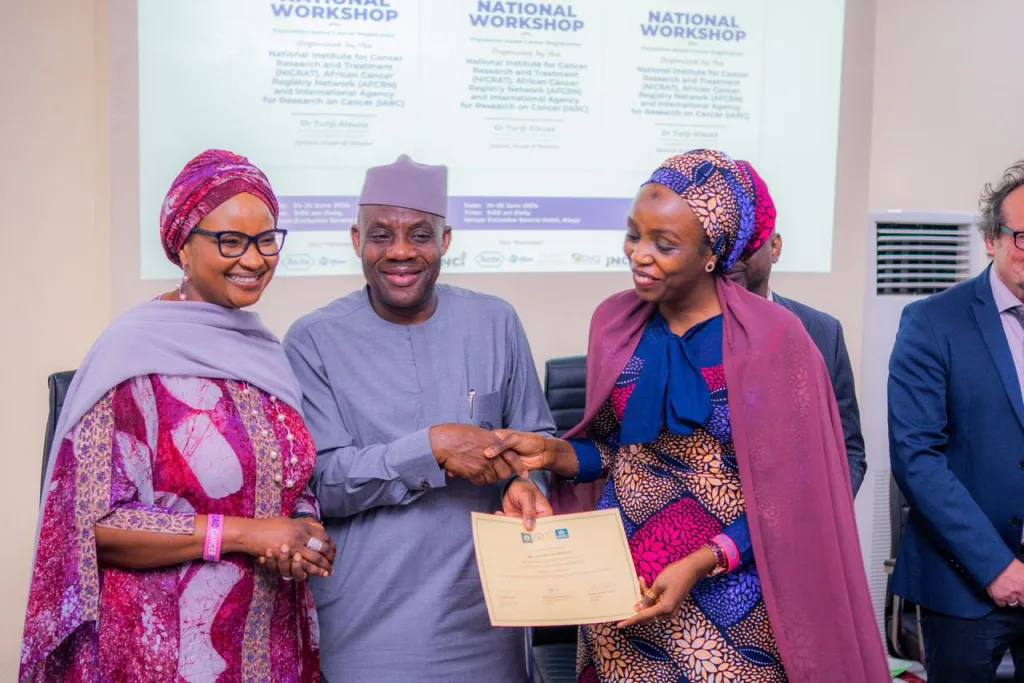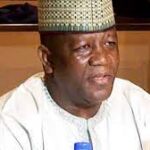…Declares cancer a notifiable disease
By Our Reporter
The Federal Government of Nigeria has charged public and private health facilities in the country to report all diagnosed cancer cases in their facilities to the National Cancer Registry.
It has, therefore, declared cancer as a notifiable disease in Nigeria.
Minister of State for Health and Social Welfare, Dr. Tunji Alausa, made this declaration at a workshop on cancer registration organized by the National Institute for Cancer Research and Treatment (NICRAT), in Abuja.
The workshop was supported by the African Cancer Registry Network (ACRN), and the International Agency for Research on Cancer (IARC).
The workshop brought together over 100 participants drawn from cancer registries and stakeholders in the cancer space across the country.
The declaration of cancer as a notifiable disease in Nigeria, the Minister said, is a significant milestone in the country’s efforts to combat the growing burden of the disease in the country.
A notifiable disease is a disease that, when diagnosed, requires health providers to report to state or local public health officials. Notifiable diseases are of public interest by reason of their contagiousness, severity, or frequency according to the Centres for Disease Control (CDC).
According to the Minister: “As of today, cancer is officially declared a notifiable disease in Nigeria. This declaration is a critical step towards strengthening our national response to the growing burden of cancer in our country.
“The decision to make cancer a notifiable disease is informed by the alarming increase in cancer cases and deaths in Nigeria.
“According to the World Health Organization (WHO), cancer is the second leading cause of death globally, with approximately 127,000 new cases and 79,000 cancer related deaths reported in Nigeria in 2022 alone.
“The lack of accurate data on cancer incidence and prevalence has hindered our ability to effectively plan, implement, and evaluate cancer control interventions.
“By making cancer a notifiable disease, all private and public healthcare institutions in Nigeria are now obligated to report all cases of cancer they diagnose to the National Cancer Registry, hosted at the National Institute for Cancer Research and Treatment (NICRAT).
“This registry will serve as a central database for cancer cases, providing vital information on cancer trends, patterns, and outcomes in Nigeria.”

While urging all private and public healthcare institutions to comply with the directive, as it is crucial to “our collective efforts to reduce the burden of cancer in Nigeria,” Dr. Alausa explained that the reporting of the cancer cases will enable the government to improve cancer surveillance and monitoring, allowing for early detection and treatment of cancer cases; enhance our understanding of cancer epidemiology in Nigeria, informing evidence-based policy decisions and resource allocation; develop targeted cancer control interventions, including screening programmes, treatment protocols, and palliative care services and strengthen collaboration and coordination among healthcare providers, researchers, and policymakers to combat cancer.
He further assured that the Ministry of Health and Social Welfare will provide technical support and guidance to ensure a seamless reporting process.
Earlier, the Director General of the National Institute for Cancer Research and Treatment (NICRAT), Prof. Usman Malami Aliyu, reiterated the importance of accurate cancer registration, adding that it serves as the foundation upon which effective healthcare policies and interventions are built.
He said it provides crucial data to understand the burden of cancer, identify trends, and ultimately, to plan and allocate resources more effectively.
Prof. Aliyu said that improving cancer registration in Nigeria is a vital step towards enhancing healthcare infrastructure.
“The importance of accurate cancer registration cannot be overstated. It serves as the foundation upon which effective healthcare policies and interventions are built. It provides us with crucial data to understand the burden of cancer, identify trends, and ultimately, to plan and allocate resources more effectively.
“In Nigeria, improving cancer registration is a vital step towards enhancing our healthcare infrastructure. It enables us to better understand the prevalence of different types of cancer across regions, the demographics most affected, and the effectiveness of our current treatments and interventions.
“Without comprehensive and accurate data, our ability to combat this disease effectively is severely hampered.
“Today’s workshop marks a significant milestone in our collective efforts. It is a platform for collaboration, learning, and sharing best practices. Throughout the sessions, we will delve into various aspects of cancer registration—from data collection and management to analysis and utilization. We have experts here who will guide us through the latest methodologies and technologies that can streamline our registration processes and improve data quality.
“Moreover, this workshop is not just about acquiring knowledge; it is about forging connections and building a network of professionals dedicated to advancing cancer registration in Nigeria.
“By collaborating across disciplines and organizations, we can create a unified approach that strengthens our healthcare system and improves outcomes for cancer patients nationwide,” the NICRAT Director General said.
The workshop also witnessed the signing of Memorandum of Understanding (MoU) between the Federal Government and the Africa Cancer Registry Network (AfCRN) for the training and retraining of cancer registrars in Nigeria.
The Minister of State for Health and Social Welfare, Dr. Tunnji Alausa, signed on behalf of the Federal Government while Prof. Max Parking, Coordinator AfCRN signed for his organisation.



